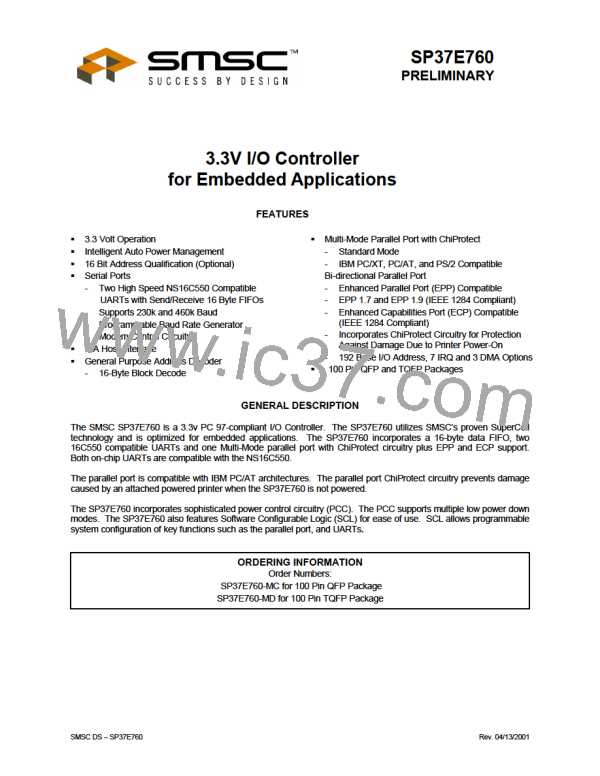5.4.2 ISA IMPLEMENTATION STANDARD
This specification describes the standard ISA interface to the Extended Capabilities Port (ECP). All ISA devices
supporting ECP must meet the requirements contained in this section or the port will not be supported by Microsoft.
For a description of the ECP Protocol, please refer to the IEEE 1284 Extended Capabilities Port Protocol and ISA
Interface Standard, Rev. 1.09, Jan.7, 1993. This document is available from Microsoft.
5.4.3 DESCRIPTION
The port is software and hardware compatible with existing parallel ports so that it may be used as a standard LPT
port if ECP is not required. The port is designed to be simple and requires a small number of gates to implement. It
does not do any “protocol” negotiation, rather it provides an automatic high burst-bandwidth channel that supports
DMA for ECP in both the forward and reverse directions.
Small FIFOs are employed in both forward and reverse directions to smooth data flow and improve the maximum
bandwidth requirement. The size of the FIFO is 16 bytes deep. The port supports an automatic handshake for the
standard parallel port to improve compatibility mode transfer speed.
The port also supports run length encoded (RLE) decompression (required) in hardware. Compression is
accomplished by counting identical bytes and transmitting an RLE byte that indicates how many times the next byte is
to be repeated. Decompression simply intercepts the RLE byte and repeats the following byte the specified number of
times. Hardware support for compression is optional.
Table 17 - ECP Pin Descriptions
NAME
nStrobe
TYPE
O
DESCRIPTION
During write operations nStrobe registers data or address into the slave on
the asserting edge (handshakes with Busy).
Pdata 7:0
Nack
I/O
I
Contains address or data or RLE data.
Indicates valid data driven by the peripheral when asserted. This signal
handshakes with nAutoFd in reverse.
PeriphAck (Busy)
I
I
This signal deasserts to indicate that the peripheral can accept data. This
signal handshakes with nStrobe in the forward direction. In the reverse
direction this signal indicates whether the data lines contain ECP command
information or data. The peripheral uses this signal to flow control in the
forward direction. It is an “interlocked” handshake with nStrobe. PeriphAck
also provides command information in the reverse direction.
Perror
(nAckReverse)
Used to acknowledge a change in the direction the transfer (asserted =
forward).
The peripheral drives this signal low to acknowledge
nReverseRequest. It is an “interlocked” handshake with nReverseRequest.
The host relies upon nAckReverse to determine when it is permitted to
drive the data bus.
Select
I
Indicates printer on line.
NAutoFd
(HostAck)
O
Requests a byte of data from the peripheral when asserted, handshaking
with nAck in the reverse direction. In the forward direction this signal
indicates whether the data lines contain ECP address or data. The host
drives this signal to flow control in the reverse direction. It is an “interlocked”
handshake with nAck. HostAck also provides command information in the
forward phase.
NFault
(nPeriphRequest)
I
Generates an error interrupt when asserted. This signal provides a
mechanism for peer-to-peer communication. This signal is valid only in the
forward direction. During ECP Mode the peripheral is permitted (but not
required) to drive this pin low to request a reverse transfer. The request is
merely a “hint” to the host; the host has ultimate control over the transfer
direction. This signal would be typically used to generate an interrupt to the
host CPU.
NInit
O
O
Sets the transfer direction (asserted = reverse, deasserted = forward). This
pin is driven low to place the channel in the reverse direction. The
peripheral is only allowed to drive the bi-directional data bus while in ECP
Mode and HostAck is low and nSelectIn is high.
NSelectIn
Always deasserted in ECP mode.
SMSC DS – SP37E760
Page 34
Rev. 04/13/2001

 SMSC [ SMSC CORPORATION ]
SMSC [ SMSC CORPORATION ]